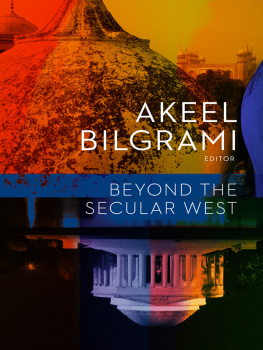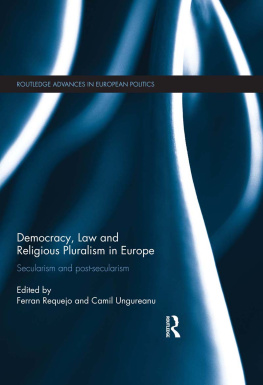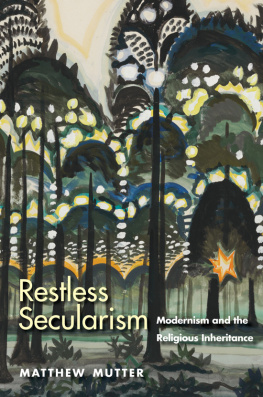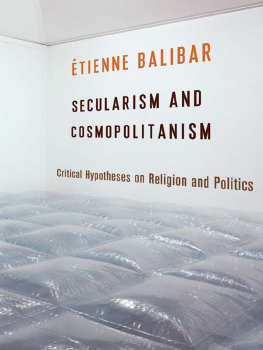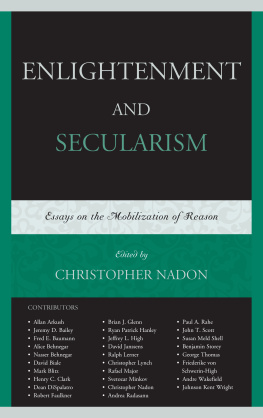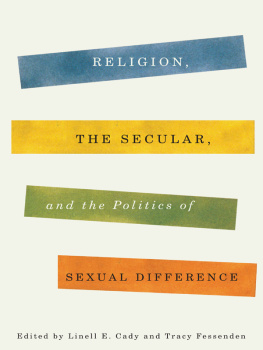BEYOND THE SECULAR WEST
RELIGION, CULTURE, AND PUBLIC LIFE
RELIGION, CULTURE, AND PUBLIC LIFE
Series Editor: Karen Barkey
The resurgence of religion calls for careful analysis and constructive criticism of new forms of intolerance, as well as new approaches to tolerance, respect, mutual understanding, and accommodation. In order to promote serious scholarship and informed debate, the Institute for Religion, Culture, and Public Life and Columbia University Press are sponsoring a book series devoted to the investigation of the role of religion in society and culture today. This series includes works by scholars in religious studies, political science, history, cultural anthropology, economics, social psychology, and other allied fields whose work sustains multidisciplinary and comparative as well as transnational analyses of historical and contemporary issues. The series focuses on issues related to questions of difference, identity, and practice within local, national, and international contexts. Special attention is paid to the ways in which religious traditions encourage conflict, violence, and intolerance and also support human rights, ecumenical values, and mutual understanding. By mediating alternative methodologies and different religious, social, and cultural traditions, books published in this series will open channels of communication that facilitate critical analysis.
For a complete list of the books in this series, see .
BEYOND THE SECULAR WEST
EDITED BY
Akeel Bilgrami
Columbia University Press
New York
Columbia University Press
Publishers Since 1893
New York Chichester, West Sussex
cup.columbia.edu
Copyright 2016 Columbia University Press
All rights reserved
E-ISBN 978-0-231-54101-5
Library of Congress Cataloging-in-Publication Data
Beyond the secular West / Edited by Akeel Bilgrami.
pages cm. (Religion, culture, and public life)
Includes bibliographical references and index.
ISBN 978-0-231-17080-2 (cloth : alk. paper) ISBN 978-0-231-54101-5 (ebook)
1. Secularism. 2. Religion and culture. 3. Taylor, Charles, 1931Secular age. I. Bilgrami, Akeel, 1950 editor.
BL2747.8.B49 2016
200.9'04dc23
2015032306
Cover design: Lisa Hamm
Cover image: Composite (top) Raghu Rai/Magnum Photos, (bottom) Kevin Grant/Shutterstock
A Columbia University Press E-book.
CUP would be pleased to hear about your reading experience with this e-book at .
References to websites (URLs) were accurate at the time of writing. Neither the author nor Columbia University Press is responsible for URLs that may have expired or changed since the manuscript was prepared.
CONTENTS
Akeel Bilgrami
Charles Taylor
Souleymane Bachir Diagne
Abdullahi Ahmed An-Naim
Alfred Stepan
Claudio Lomnitz
Peter van der Veer
Sudipta Kaviraj
Rajeev Bhargava
Akeel Bilgrami
Charles Taylor
T hese essays were conceived among a handful of scholars from a range of disciplines (history, politics, philosophy, anthropology, law) and provoked by the intellectual claims of an impressive book by Charles Taylor published a few years ago, bearing the title A Secular Age. The provocation was simply this: Could a work that had analyzed in great historical and analytical detail the emergence of the secular in Latin Christendom carry lessons for other parts of the world?
Though Taylor himself had avowedly restricted himself to a focus on the Latin West, given the intrinsic generality of the concept of the secular as well as the ideological mobilization that European imperial conquest of distant lands had made possible, a question about the reach of the concept was never far from the offing for Taylor himself and for anyone reading his book with an alertness to its widest implications.
The authors of these essays, though they are by no means all restricted to Columbia University, got together several times over three years or more at Columbia University (and at periodic retreats in nearby Tarrytown, New York) to pursue this large question. The discussions proved so fruitful and exciting that we decided to gather our thoughts and deliver them in essays, which Columbia University Press has helpfully agreed to publish as one among its cluster of publications on the themes of secularism and tolerance.
The essays were always intended by us as looking to the interest of the secular in many different parts of the world beyond Christendom, but no group of scholars could possibly aspire to comprehensiveness on this score. Still, when China, India, Latin America, Africa, and the Middle East are all on offer in one or other essay, it is no small spread. Regional range apart, there are also diverse intellectual and methodological angles provided by the different disciplinary locations of the authors, and there is an illuminating balance between observing the points of affinity and departure from the genealogical roots of the secular in Europe, while also elaborating the local flowering of secularity in quite autonomous terms in these distant settings. India, unsurprisingly, gets somewhat more play in the volume than other settings, because secularism (the specifically political doctrine that emerges from the ideal of the secular) has been a subject of such intense and prolonged discussion there just prior to and since decolonization, and it raises questions of its own as to why this should be so or comparatively more so than in other regions of the global South. In general, as one would expect, the essays raise as many questions of this sort and others as they answer.
Many of these questions are very usefully and clearly introduced by Taylor himself in an opening chapter. It would be redundant of me, therefore, to do so in this short preface, as it would be for me to present summaries of the essays that follow, because Taylor himself provides them in an equally valuable set of replies in the concluding chapter.
The volume, thus, owes greatly to Taylors most obliging willingness to participate in these proceedings and to Al Stepans inspiring enthusiasm for the subject that infected each one of us. I would like to thank them both and all the other contributors to the book for their essays, a thoroughly fitting outcome of some of the most searching and lively discussions one could hope to have with ones academic colleagues. My thanks too to the Institute of Religion, Culture, and Public Life at Columbia University for bringing many of us together frequently and for its various hospitalities over the years, and especially to Melissa Van for her vigilant eye on all matters of organization and her gently prompting presence during the editing of this volume.
Akeel Bilgrami
Charles Taylor
We live in a world in which ideas, institutions, art styles, and formulae for production and living, circulate among societies and civilizations that are very different in their historical roots and traditional forms. Parliamentary democracy spread outward from England, among other countries, to India. And the practice of nonviolent civil disobedience spread from its origins in Gandhis practice to many other places, including Martin Luther King Jr.s civil rights movements, to Manila in 1983, and eventually to the Velvet and Orange revolutions of our time.
But these ideas and forms dont just change place as solid blocks; they are also modified, reinterpreted, given a new spin and meaning in each transfer. This can lead to tremendous confusion when we try to follow these shifts and understand them. One possible course of confusion comes from taking the word too seriously: the name may be the same, but the reality will often be different.

